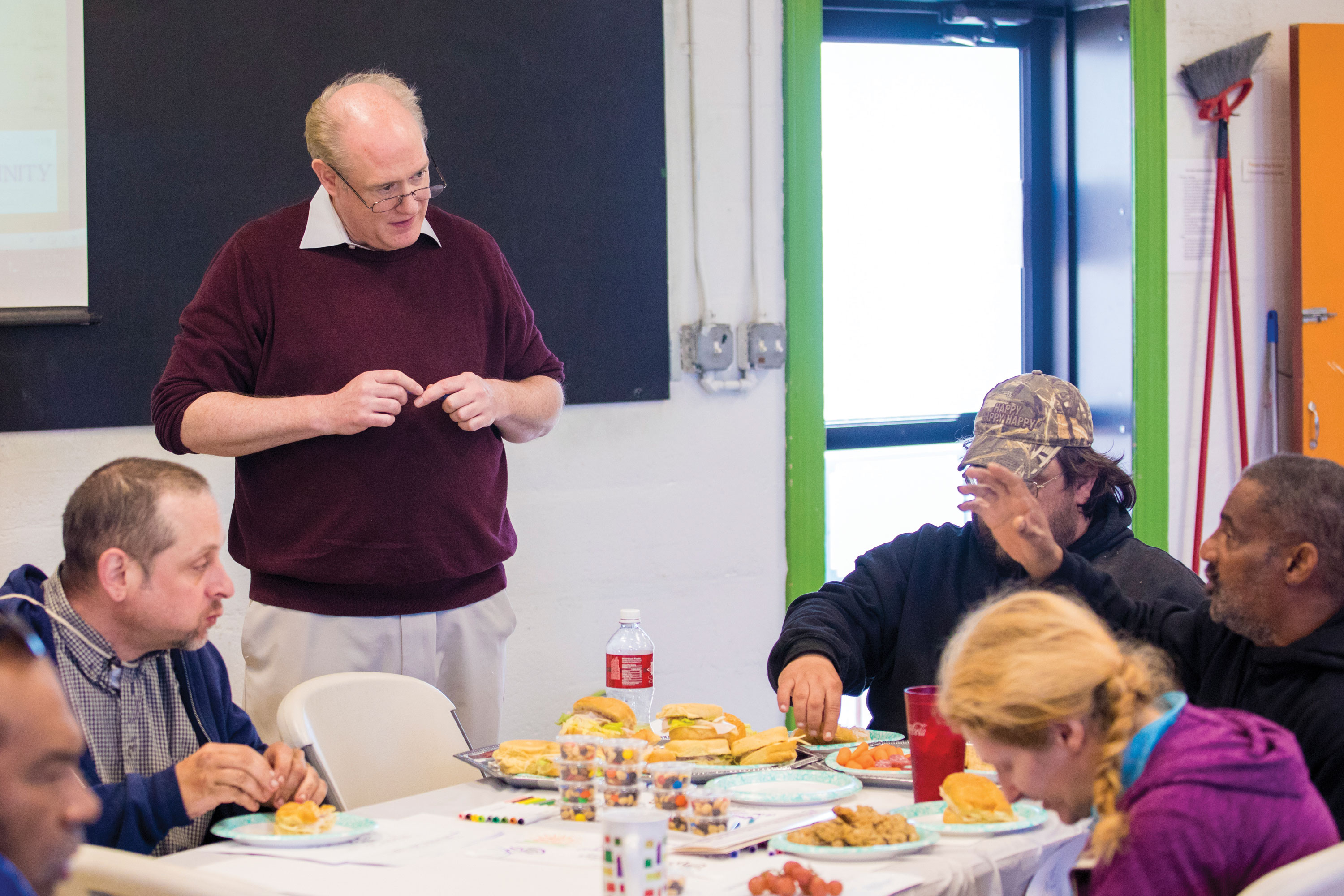
CJP is a practice-oriented program, preparing students from diverse cultural and professional backgrounds to engage proactively and reflectively in complicated real-world settings of conflict and injustice.
But what does that mean in actuality? It means each CJP student doesn’t only read about and discuss core theories and skills of mediation and negotiation, facilitation and nonviolent mobilization for social change. And they also have the opportunity to apply learnings to a real situation with a client and then reflect, drawing on the wisdom of others – and the wisdom within – throughout the process.
The result is a transformative and challenging learning experience that contributes to both personal and professional growth, says Practice Director Amy Knorr MA ’09.
And, she adds, the process benefits the community. In recent years, as this outreach was emphasized by Knorr and faculty, CJP students have developed a strong reputation among local organizations as skillful communicators. Many organizations bring specific needs to CJP; Knorr helps to link these opportunities to coursework or as extracurricular volunteerism.
“The combination of the theory, the practice opportunity where skills are implemented, and the collaborative interaction with and feedback provided by classmates, faculty and staff here at CJP creates a potent learning situation,” Knorr said.
As an example, take Professor Catherine Barnes and her spring 2019 facilitation class. To her teaching, Barnes brings decades of experience designing and implementing deliberative dialogue processes in more than 30 countries. That lends credibility to one of her goals stated in the syllabus: Participants will become familiar with a variety of methods and techniques to achieve process goals, with groups ranging in size from three to 3,000.
During the class, students pair up to design a deliberative process for a client, then implement that process, receive constructive feedback from their partner, the client and Knorr. Barnes meets with the students in a final coaching session.
“We want to support the development of ethical, self-aware practitioners,” Barnes said, “who not only know how to use appropriate techniques but who also understand the deeper underpinnings of processes for working in complex contexts, with a lifelong habit of continually learning from experience for increasing effectiveness in the most challenging environments.”

Your partner in such an exercise could be a seasoned diplomat like Jim Herman, who served for a time as consul general of the largest U.S. consulate in the world in Frankfurt, Germany. He’ll retire soon, after a career that includes service in six other countries and Washington D.C.
Or it might be someone like Dawn Curtis-Thames, a hospice nurse whose years of experience working with patients and families in the liminal spaces of life and death brought her to more intensive study of peace and conflict.
Herman, who plans to start a coaching and teaching firm rooted in RJ principles with his wife of 27 years, says that the way in which Barnes carefully designed her facilitation course to “create safe space” for the sharing of different perspectives “enriched our interactions.” Not only was his own learning deepened in the classroom, but he was reminded through his practice partnership with classmate Kate Smucker that “two people with such different backgrounds can come together and complement each other’s skill set.”
Interviewed a few short weeks after the semester’s end, Herman said he’d already used several new facilitation methods in his current work. Polarity management helped his team explore a touchy issue and the eventual “recognition of the interdependence of two seemingly different ideas.” Several other techniques helped to “defuse office conflicts, which were negatively affecting morale, customer service and productivity.” As a result, communications improved and colleagues began to rebuild morale.
Growth in knowledge and skills is one obvious benefit of practical application. Another is networking, building connections through which students hone skills and deepen their self awareness and confidence as practitioners.
That was the case for Curtis-Thames, who worked with Our Community Place, a Harrisonburg-based nonprofit focused on meeting the needs of homeless people. She and classmate Ed Hagan, an attorney and mediation expert, facilitated a listening session with the organization’s clients, utilizing the world café method to learn more about daily concerns of both individuals and the group as a whole.
“Hospitality is a core value of this organization and the world café facilitation strategy shared that value. I was so pleased and energized by the engagement of the clients. We were really in their zone, which is how it should be,” Curtis-Thames said. “Facilitation is about offering the leadership to hold the space open and keep communication real, making a good space for meaningful and purposeful conversation that leads to social change.”
As with many practice opportunities, student-facilitators are often engaged beyond the initial exercise. Later, Curtis-Thames and her partner were asked to present the results at a city council meeting.
In the coming year, Curtis-Thames will return to the organization for her practicum and capstone. She’s excited to continue the learning experience.
“I learned so much from watching the organization staff and clients interact with each other,” she said. “I learned probably as much in that as I did in the whole process.”